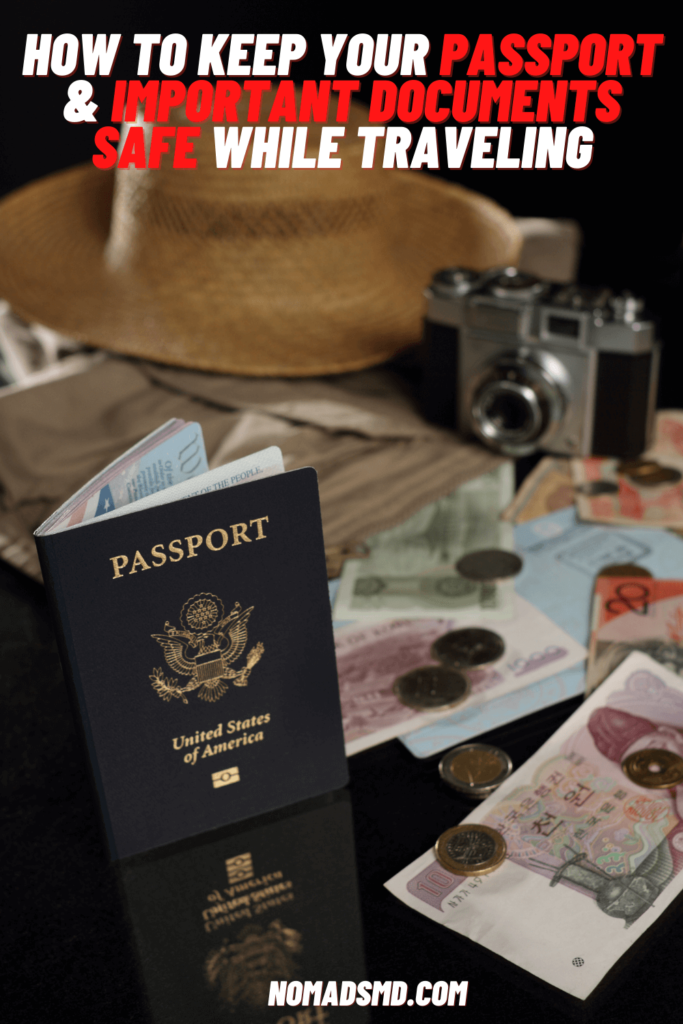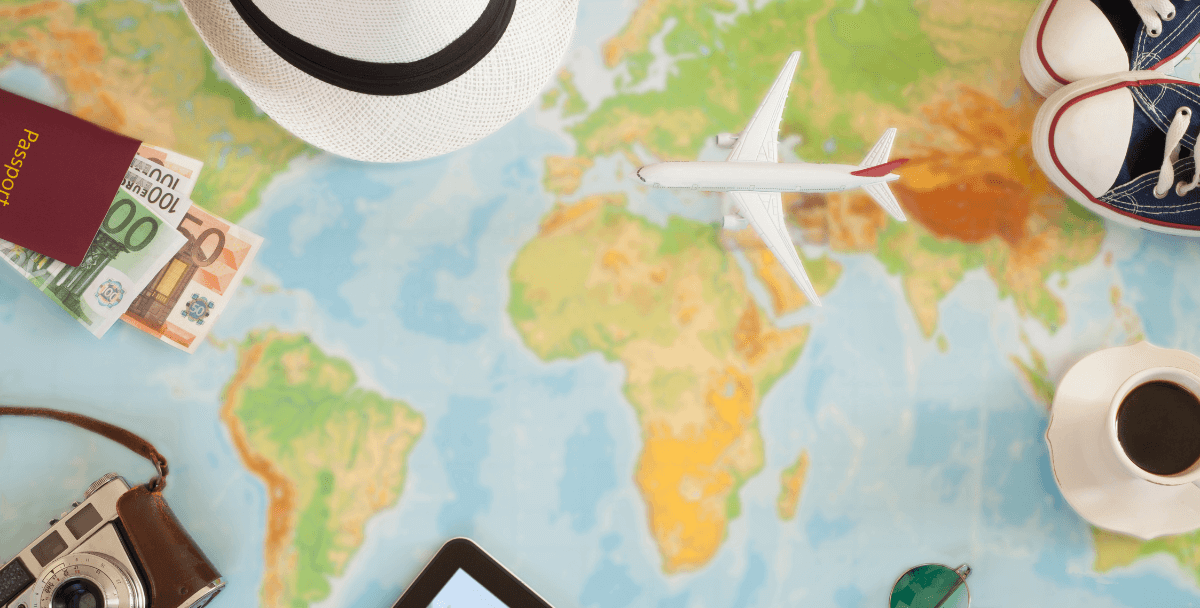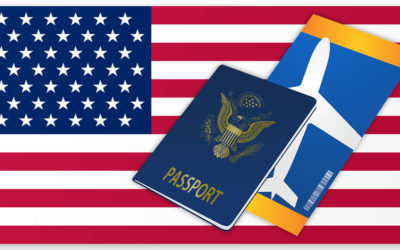Moving abroad is also an experience once in a lifetime and requires due thought. It’s essential to become rational before you drown yourself in the thrill of being in a new location with a foreign culture and traditions. Know how to prepare your transfer, coordinate preparations, and gather the patience and resolve to see through the next trip if you are thinking about traveling to another place.
When you transition to your fresh start abroad, the first days and weeks in a new world can be thrilling yet terrifying. A lot of stuff will trigger anxiety in the first few weeks when you’re about to travel to a new country, and you may feel nervous about your new career or educational environment.
You may be concerned that you will not be able to sort out the public transit system, or you might just want to find the right places to buy your meals. But you can more easily relax in your new place as long as you take the time to plan your first few days and assign yourself little goals to achieve. It is challenging to relocate to a foreign world, and some tips can help you adjust to the transition.
Moving to A New Country? 16 Must-Dos to Avoid Big Hassles
Moving to a foreign nation is invigorating and terrifying in equal portions. You never know how closely connected you are to your home country’s culture until you travel abroad and face a distinctly different community from your own and maybe a language. We’ve put together a thorough and ultimate guide when we share the must-do tips to make you ready to move to another country on your own with no hassles.
1. Secure Housing
In a foreign country, you are homeless. The local hostel, motel, or welcoming sofa will only hold you so much before you need a more stable place to stay. You may think that finding a lovely location in the central city, close to all the big attractions and with a grab, would be easy, but that’s not true. Those areas are pricier, and you can have to be creative to find a position within your range where work.
You might contact a real estate agent, which is a bit of an old-school trick, scan classifieds, speak to other expatriates, or use one of the many digital housing services out there to afford accommodation on your own.
When you accept your contract, be ready to pay your first (and sometimes second) month of rent as a security deposit. If you can write a check from your bank account, even borrow the sum of money, or find out long in advance if there’s any way you can pay.
Typically, a phone call to the central bank telling them to lift a transfer cap momentarily is adequate to get the funds out of your bank account. Make sure to have enough money to offset all upfront expenses before the first payday without resigning to noodles. Don’t forget about your water, power, garbage, and internet bills.
Try to arrange your accommodation with local support, mainly if there is a cultural divide. Their insider’s viewpoint can prove insightful to help you escape future scams for additional payments (“Immigrant’s tax”), that you are in a decent neighborhood, and ensure that your deal does not include a humorous business. If this local is a close associate who cares for you sincerely, much better!

2. Research Well Before Leaving
So if you’re pretty comfortable with where you’re moving, to prep for the big transfer and ease the adjustment into your new house, you’ll need to do more study. You should ask yourself more questions and consider everything. This may sound simple, but until the last moment, too many people abandon their study or, worse yet, leave it until they get there. This is not the way it ought to be handled. It would be best if you traveled to a new town or country with the impression that you already know it before touching base, researching job opportunities, living costs, housing, health services, and more.
Are you going to ship your possessions to your new apartment, or will you store them in your native country? You’re going to want to consider each one’s logistics and expenses, which can add up to thousands.
If you make a much more permanent transfer, you might also want to sell your possessions. Find out where you can now buy must-have things such as appliances, mattresses, kitchen equipment, and cookware if you intend to travel overseas with two bags and a carry-on.
Are you going to drive, or does mass transit connect your town? You’ll want to weigh the consequences of exporting your vehicle, purchasing a new one, and hiring a car if you intend to travel. Depending on the country you travel in, you will have to have an International Driving Permit (IDP) before you transfer and a new driver’s license.
Learn as much as you can from it while using public transit. Think about bus versus subway, monthly passes versus yearly passes, etc. It will help you conserve cash and avoid misunderstanding when you get there.
Get accustomed to the community before the big move. Study the past of your new home and how the state truly operates. Read up on the social customs and codes of etiquette. Engage in books and movies in your chosen destination, and learn a few terms and phrases if you are moving to a world where you don’t understand the language. It can help offset cultural shock and reduce social faux pas by studying and knowing the society (although imperfectly).
Don’t overthink about being an awkward newcomer. Of course, you’re going to make mistakes, but as long as you’re exercising a touch of common decency, read up on your simple ethics and channel some approaches that you’ve only used for your grandma and you should be good. That being said, some traditions are more sophisticated than others.
Find out and stop any particular ways that you could annoy the locals! It may mean not chewing with your left hand, showcasing the soles of your feet, or putting knives and forks into a pile of rice, depending on where you are.
Learn how people are greeted and how to enjoy a meal. These are two of the biggest lessons you will learn overseas, and you will probably even get a few new, tasty meals to share with family back home from traveling overseas. Check out the local festivals. This will help you move everywhere you live in the cultural landscape. Keeping a list could also alert you about imminent non-stop fireworks, huge water battles, or vibrant powder-filled festivities.
Just as if you were visiting a foreign world on holiday, you would want to know about the region’s norms and cultural standards before you get there. To get habituated, it is essential to grasp behavioral norms, and it is better to know them before you go than to try to work them out the slow way. Try and read up in your soon-to-be home on social behavior, and you will make the switch from tourist to local a lot easier for yourself.
You don’t have to be bilingual by the time you get there if you’re going to a country with a vocabulary that you’re inexperienced with (it’ll be way easier to do that until you learn it and say it every day), so you should know the fundamentals. In the start, get familiar with basic niceties such as “hello” and “thank you,” as well as words that will help you move around. Several free online language resources act as fantastic jump-off points.
3. Start Saving Money
Remember how much money going around the country takes. Now, think about how long it will take to get you to the other side of the country! Costs include, but are not limited to, passport fees, flight fares, overseas shipments, hotels, and crises. The best step to save cash is to travel on a budget and avoid extra costs.
The old advice to have reserves worth six months is fine, and when going overseas should be a start. We can recommend studying the currency value and the standard of living in your new home and a monthly spending schedule for the big move. For the first six months, be willing to incur unforeseen expenses.
4. Get A Job Before the Move
There are some options to make your career search abroad easier if you do not already have a job set up until you complete your transfer. You will be more financially stable after you have found a fantastic career. Plus, as a way to meet new friends who can take you around and help you familiarize yourself more easily with your new environment, you can use your office.
You can reach into the strength of your existing systems to begin with, or you can attend career fairs and networking activities. When it comes to securing a job abroad, recruiting agencies can also be very beneficial, primarily because many of them concentrate on filling temporary positions.
It is possible to pursue a job abroad, but it can be challenging to look for a job abroad because of the scope, shifts in customs, and more. Fortunately, there are many ways to do it, such as calling a foreign recruiter, demanding a move or telecommuting from a company, posting on a work board, or having a remote spot. Before you pass, you can even find an overseas job by searching for rivals in your new place or contacting a specialist work program to help do the job for you. If you don’t have any previous work experience, you can plan to start a new business idea using your saving in your new home country.
Learning how to negotiate a work deal is just as important. Your new place will have a different standard of living, so looking at the average wages for other occupations and industries in your new city is essential.
Ensure your wage, living costs, adjustments in currencies, and more are listed. You don’t want to overlook your insurance scheme if available, either. Ask for days of leave, sick time, and other compensation. It can be a prerequisite to getting a work visa or a permit that may be difficult to obtain. Apply for the necessary permits before you quit to ease the procedure.
You will have to figure out whether or not the package provides a budget for items like school costs, rent, medical care, and additional features such as training or job assistance for your partner, communication lessons, or travel home in the event of an emergency. Be sure you know what is and is not included upfront to prepare accordingly for your new life.
5. Making New Friends is Hard
You’re going to want someone to share your experiences now that you have a comfortable, convenient apartment. The thing is, you don’t have the slightest idea about where to meet anyone like that.
Getting a community of friends was pretty straightforward during your high school and university years. All of you were the same age, took part in the same sports, and grew up in the same city. To transform strangers into friends, you had classes and regular encounters. Beyond the original “Will you be my friend?” discussions we all had in school, odds were that you never even had to look for a friend or two.
It’s a new experience. You’re out in the actual world, and meeting strangers in a foreign place means putting on a brand new friend-making strategy. You’re not a nomad, but the whole backpacker scene isn’t for you. If you’re employed in a business or college, your new teammates will also be your mates.
If not, the entire “friend thing” gets even more enjoyable. You don’t want to live in your past on Social media, but you don’t know how to keep living in your future abroad. Watch the video below by Lauren for quick hacks to make new friends abroad.
Offer a whirl to Online Mates. Bloggers are friendly people to hear about their culture and strive to be in touch with it. Do a quick check for people who write about your region to see how you can schedule a coffee meeting. Check for neighborhood gatherings, get-togethers for ex-pats, or gatherings for couch surfing. Of course, on the first few occasions, meet up in public places.
Take an interest in a civic association. Can you like cooking? Do you ride bikes? To catch the beautiful sunrise, do you wake up ridiculously early? Ex-pats and natives would have groups that feel the same way. Find a community of shared interests online.
6. Stay in Touch with People Back Home
You want to spread the fantastic news with your families back home now that you have both a great pad and a squad of good friends. There’s no chance you’d ever drift away from others, right? With Skype, FaceTime, Snapchat, and a whole host of other channels, you can stay connected to people back home.
Please immediately relieve yourself of this ideology. You can say goodbye to a lot of heartbreak and anger. And without the additional challenge of interpreting into a different cultural prism, staying in touch requires a lot of time. At a hole-in-the-wall eatery down the lane, as you enthusiastically burble on about the excellent roast duck, your friends and family back home will nod in friendly curiosity. Also, remember to use an ideal VPN service to secure connection to your emails, social media accounts, and work backups to prevent any locking out because of the new location IP.
An initial phase of enthusiasm about the new lifestyle will occur, but it will disappear. Your lives are on many different roads, and knowing what they have never seen can be daunting for other people. Be polite and competent. This is about both you and your family and friends. Although you should be able to share your new life, the intrepid adventurer, you should not dominate the conversation. Your friends and family can go through a particular stage of life, and their everyday actions still matter.
Try to stop being arrogant. You’re not intentionally showcasing how amazing your life is to your peers and family, but it might come off that way.
7. Understand the Transportation and Foreign Bureaucracy
All you need to find out now that you have the fundamentals down is how to survive in this new world. Bear in mind that many nations’ government departments are moving at a slower pace. This, young grasshopper, is where you gain discipline.
The first time you ride mass transport independently and effectively, you’ll want to do a happy dance. It can be a difficult challenge to reacquaint yourself with all those dozens and dozens of bus lines, change the foreign currency correctly, or purchase a ticket from the automated dispenser with directions written in what may be incoherent nonsense as well.
Make sure your passport is in place. Understand where the government departments are and know how long a delay is required for each consultation. Most notably, however, bring a book, try not to get irritated with all the red tape, and rejoice when it’s all over with your new mates.
Understanding local transit will profoundly benefit you. You need to understand all of these things: Metro, subway, taxi, pushbike, bike. See whether you can buy a monthly pass or if you will need to purchase a new ticket for each ride. If motorcycle taxis are the fastest way to get around, buy a helmet and certainly make sure that these are protected modes of transport.
Traffic movement is vital. Any time you cross the road, you need to know whether or not the cars will stop for people or whether you will have to play a complicated game of escape. Pay attention to how someone else rides, especially if you’re on a scooter or bike, and do as they do.
For the first time in your life, you’re leaving to live in a different world, and you couldn’t be more nervous. Stick to the curiosity as closely as you can, for you will be immensely threatened by the next few steps of going overseas on your own.
8. Take Care of Passport and Important Documents
You must have a valid passport before you can even obtain a visa. Any nation demands that you have a valid Visa for at least six months after the actual departure date. If your passport expires when you are overseas and do not have a fixed return date, you can extend your permit at your nearest U.S. General embassy or consulate.
To see what supporting documents you will need to submit for your request, which will differ based on the visa, first search the government website of your host nation. Suppose you apply for a student visa in the United Kingdom. In that case, you need to have a transcript of your university offer letter and evidence that you have enough resources to finance your studies. You would even need to set up a U.S. appointment.
There is a lot of significant paperwork that you cannot leave aside when you go overseas. This covers your Visa, passport, birth certificate, driver’s permit, employment and residency permits, medical history, vaccination records, and appropriate arrangements or agreements. Any of it is in addition to your medications, contact numbers for emergencies, and credit cards.
Visa requirements range from one nation to another, and you can qualify for many kinds of visas. If you apply for a tourist visa, a work visa with the aid of your boss, or a student visa to study abroad, the aim is to obtain your visa before you finally make your transfer.
Your visa payments will rely on the nation you are going to and the intent of your application. To obtain the details, you need about your visa, its fees, and the interview process, you can contact the Overseas Consulate general Office of the country you are preparing to travel to in the future.

Your passport is another document that you will use before traveling overseas. If you have one anyway, verify that it has not expired. Since it may take a few weeks to process in the mail, give yourself ample opportunity to register for a brand new passport or extend an old one.
Renewing your passport before you travel is also intelligent if it expires when you are staying overseas, as you would need it to be valid on your return trip home. It would help if you planned to pay a fee for generating or renewing your passport, much like your visa.
Pack a copy of your driving record to register for a new driving license if you intend to ship your car or get one after your transfer. Doing that could also help you stop needing to go through driver education because when it comes to buying the car insurance you will need, the driving record will also be helpful.
9. Plan for Healthcare in Advance.
You will eventually run into the health care system while you live overseas. When you go, find out whether you will be protected if you are overseas by the new health care company. Ask for medical records from the health care providers to get all the required immunizations. You will still need to figure out if the prescribed drugs in the country are permitted and, if not if they are readily available. If not, on your journey, bring an additional supply with you.
Moving abroad involves moving into a different world where things can temporarily get more difficult for daily life matters. Before you pass, learn how to look after your health insurance, finance, and other primary needs.
Going abroad most frequently results in financial adjustments when it comes to new expenses, foreign and municipal taxation, and wills and insurance. Have the ducks in a row to guarantee that all your accounting is correct to have peace of mind.
10. Contact Your Bank and Understand Cellphone Plans
We recommend maintaining your existing bank account to maintain your credit history and make direct contributions for any continuing bills or existing debts. Inform your bank and credit card provider about your travel plans, and to reduce overseas transaction costs, consider obtaining a global credit card.
You can also review banks to figure out what paperwork you will need to create a savings or checking account in your new place. Setting up an account will take a long time; even if you can’t get one before leaving, doing something as essential as getting the documents can help ease the process.
Because it can be pricey for foreign mobile phone contracts, we also recommend telling your provider to access your smartphone before traveling. You can buy a SIM card from a local carrier and swap it with the one on your account while you are overseas.
11. Embrace Homesickness and Cultural Shocks
After moving to a foreign place, homesickness is entirely natural. Immersing yourself in a foreign culture and traditions can make you feel lonely or leave you wishing for the conveniences and stylistic similarities of home in your encounters. However, don’t encourage homesickness to deter you from loving your new home. Acknowledge it. Just don’t stress about it. It would be difficult to acclimate if you waste your days casually chatting with your mates back home instead of going out and making new ones.
In one way or another, you and the rest of your relatives will all undergo cultural shock. So being prepared for the impact will help you feel better when it hits. If you didn’t choose your next home, you could check our guide about the best countries for American expats for a minimum cultural shock and easy integration.
Even if you’re looking forward to all the change and are genuinely optimistic, cultural shock may also set in-you may find yourself instantly missing food that you can no longer afford or TV channels that you can’t watch. You may yearn for your habit or miss the smells and sounds you were familiar with. And then, when you least expect them, these homesick emotions come on unexpectedly and are caused by the slightest things.
The trick is to limit the effects of all these shifts hitting simultaneously. As soon as you know where you’re going to have to sit as a community and begin your studies, watch loads of documentaries, read newspapers, look at your new town on Apple Maps and simply figure out as much as you can before moving.
It also means moving to a different culture and a new lifestyle to relocate to another nation. Although most of us have undergone cultural shock at one time or another, it is not anything to take lightly. Before leaving your homeland, find out what culture clash is, the physical signs, and what you should do to brace for the transition. Get used to your new house by making your location comfortable with home artwork and family members’ framed pictures.
12. Learn the Language
If you are not still fluent in your new country’s language, so part of your plans for moving should concentrate on understanding as much of your foreign language as you can.
In your new area, contact with the people, however simple, will make you feel more settled and secure. Many nations will always use English as a second language, which can significantly benefit you if you’re struggling. So do give your new language a try first. The longer you use it, the better it will become in normal, daily circumstances.
It’s also worth learning the local pronunciations while going to a country where English is the mother language. Every city or town will have its particular accent and use jargon words for things that you won’t be used to listening to, and that could initially create some confusion.
If you don’t understand the language already, sign up as soon as you can for lessons. Nothing will make you feel more alone than if you do not comprehend others around you. It takes years of practice to perfect a language, but you’ll find that just studying those simple phrases makes a big difference. It takes little work to know what to say in a supermarket or at the gas station, and you can feel more connected to everyone around you.
13. Create A Comfortable Zone for Yourself
Your house should be wherever you live, a haven that you will return to for peace and warmth. This is particularly true when you live somewhere that is new. Take some extra precautions to make your new home or apartment sound at home, adding to your style and stuff that reminds you of what you left behind.
Post photographs of your family and friends, stock some everyday staples in your fridge and freezer, and curl up with the blanket you’ve had since you were a kid. You will always know that there is a space for you to chill that doesn’t feel so strange and unfamiliar.
Home is where, mainly when you go abroad, the heart is. Put time and effort into making your house feel like a home, whether you have your bedroom, a college dorm, or a communal flat. Accessible information such as candles, fluffy sheets, vibrant artwork, and friend and family images make a massive difference. Buying new flowers and good-smelling candles adds immediate comfort and support on the cheap while you are in a position for only a short time.
14. Start Exploring
One of the easiest ways to migrate to a new country is to indulge yourself in a different culture than you’re used to in your homeland. It is both enjoyable and a way to accustom oneself to your new world and make a point to learn and experience everything surrounding you.
So, seek out popular locations and sights, and take plenty of long, lasting walks, paying attention to the people and stuff you see along the way. You will discover the lay of the land quickly and what makes it so unique.
Talking to people can be challenging no matter where you live, especially after living abroad, and it can feel particularly daunting. Nevertheless, it’s a necessary part of transitioning to a new world. Meet your friends, search for clubs and meet-ups, and initiate fun discussions in areas like parks and coffee shops.
Sure, it may be a little intimidating to do, but if you feel alone, you will have a hard time getting habituated. Start by entering some online groups if it is more relaxed and recommend some physical gatherings.
Voluntary work is a great way to meet people in your new nation and hear more about the problems. It will allow you to feel linked with your new group as well. If language is a challenge for you, volunteer to work at a school or community center to teach your mother tongue.
Check web directories and local advertising to see where assistance is needed. As a volunteer, everyone has something they would contribute, and you’ll be surprised by how much you get back in exchange.
Food is food, which is why you will feel an urge to want to stick to what you understand when you travel. Food is also a lifestyle and one of the best ways to learn about your new nation.
Ignore the lure of popular recipes and restaurant chains and continue to eat like the locals. In the kitchen, if you love cooking, visit markets and stock up on exotic products that describe your foreign home’s cuisine, then get imaginative. You don’t have to give up your long-time classics, but venture out and explore some new ones.
15. Adjust Your Routine and Goals
All nations have their schedules. If that means evening tea breaks, evenings that arrive at 10 pm instead of 6 pm, or whole days when downtime is the only requirement, instead of struggling against it, you’re better off enjoying the rhythm of your new place.
Go with the flow and change your schedule to the way folks around you work, no matter what you’re used to in your homeland. Adjusting your routine is much better than making things fit in the confines of an environment where it’s not the standard.
Imagine everything you want to do when you move to a new place, whether it’s fluent in the dialect, finding a career, finding a community of friends, etc. To do it, then take proactive steps.
Working for various targets will add meaning to your days when things can feel so up in the air, and the objectives themselves will help you feel more of a part of the local society. In your new country, concentrate on goals that will support you well, and please make sure to rejoice as you accomplish them.
16. Take Care of Your Finances
So you’ve set a budget for your transfer, and you’ve already estimated how much you’ll have to spend for anything from your travel and your hotels to different foreign shipping rates to ensure you have anything you need once you’re moved in. But, wait, there’s more. It would help if you remembered other things before going overseas for your money, even though it is only for a year.
Since you’re going to move temporarily to another place, you probably keep your old checking balance open. However, in contrast to that account, you will also be able to open a checking account overseas with your passport and other documents to transfer paychecks and transfer funds with greater ease.
Estimating your monthly costs in advance is a good idea if you don’t have a job secured yet since you would be able to guarantee that you have enough cash in the bank to sustain yourself before you find work. On top of that, figuring out how your credit cards and debit cards should be used internationally and what costs you may pay to do so is also a brilliant idea.
Opening up an account with an internet banking provider such as OFX is a perfect way to experience financial security. In this way, without paying the high margins and costs that banks charge for the same operation, you can conveniently send money to a foreign bank account from your home bank account and vice versa.
In addition to being able to afford the required expenses back home while you are overseas, having your home bank account open would also give you peace of mind. If you need extra money while working abroad, you will still have a support system.
The Takeaway
It is a big step to decide to travel overseas on your own. It’s the perfect chance to discover the country, get to know another city, and encourage your freedom. Going overseas would undoubtedly be a struggle, but it’s entirely conceivable and worth it with the proper preparation.
Moving to a new nation is not always an easy transition, and with it, a mysterious new country, but it is an exciting chance. If you have made the change permanently or are briefly only there, use it to learn and develop as an opportunity, opening your eyes to other forms of living. And when you’re feeling lonely, remember: your old home is only a flight away by plane.
It is not easy to travel abroad, and you’ll have moments when you reconsider your answer. Focus on being optimistic, no matter how daunting the condition might be. Over the years, a mantra I’ve embraced that gets me past tough times is: It’s not going to be like this forever.
That reminds me that any circumstance is temporary in existence. Keep going ahead and believe that it will also alter the present emotions towards a situation. Today’s end of the world could become next year’s joke of a hilarious tale. Try these instructions, and in no time, you can have a brand new life in a fantastic country overseas.










